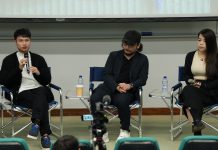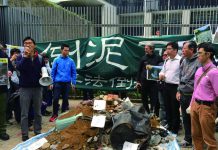In the case of the Hong Kong Section of Guangzhou-Shenzhen-Hong Kong Express Rail Link, the MTRC, the project proponent, hired AECOM Asia Company Limited as the construction contractor. In turn, AECOM Asia hired AECOM Environment, a consultancy under AECOM to conduct the EIA report. Varsity contacted AECOM Asia Company Limited for comments but they refused to be interviewed.
Without a system of checks and balances, Tam says most EIA reports will claim any damage is “acceptable” and “limited” no matter how destructive the construction works will be.
“[The EIA procedure] is wrapped in layers of injustice,” he says.
In the case of the third runway, the Airport Authority, which is a statutory body of the government, proposed the plan with full government support. The ACE members, who are appointed by the chief executive, passed the EIA report. Then, the EPD director, who is a civil servant, made the final decision to issue the environmental permit.

“[The government] is the referee, the player and probably the assistant referee,” Gabrielle Ho Ka-po, a project manager of Green Sense, adds. Since EIAO enforcement in 1998, only one EIA report has been rejected by the EPD director.
In response to questions about the reliability of EIA reports, the EPD described the EIA procedure as a “professional, objective and transparent” procedure in a written reply to Varsity.
However, Chau Kwai-cheong, deputy chairman of the ACE and a retired professor of geography and resource management at the Chinese University of Hong Kong, admits there are loopholes in the system.
“[The project proponent and consultancy] may drink beers together and do each other a favour,” he says. “EIA is not science, it’s ‘half’ science. There is no absolute objectivity,” he adds.
For instance, a consultant may choose a different scienctific model and apply different assumptions in order to get a favourable result in an EIA, yet, this would not violate the terms of the EIAO.
Since the EIA report on the expansion of the airport satisfied every EIAO requirement and incorporated some compensatory measures suggested by the ACE members, Chau says he had no grounds to reject the report even though he questions whether there is a need for the project and is concerned about the survival of Chinese white dolphins.
“I have no choice,” says Chau, “it’s like swallowing a bitter pill, being forced to accept.”

As the government promotes sustainable development, that is finding a balance between the community, the environment and the economy, Chau says the EIA is inadequate. He thinks the government should also design a social impact assessment that is applicable to big-scale projects and which would involve rehousing plans.
“The government, especially the current one, emphasises development,” says Chau, “No one knows what balance is; I don’t really know.”
Edited by Zoe Tam









































